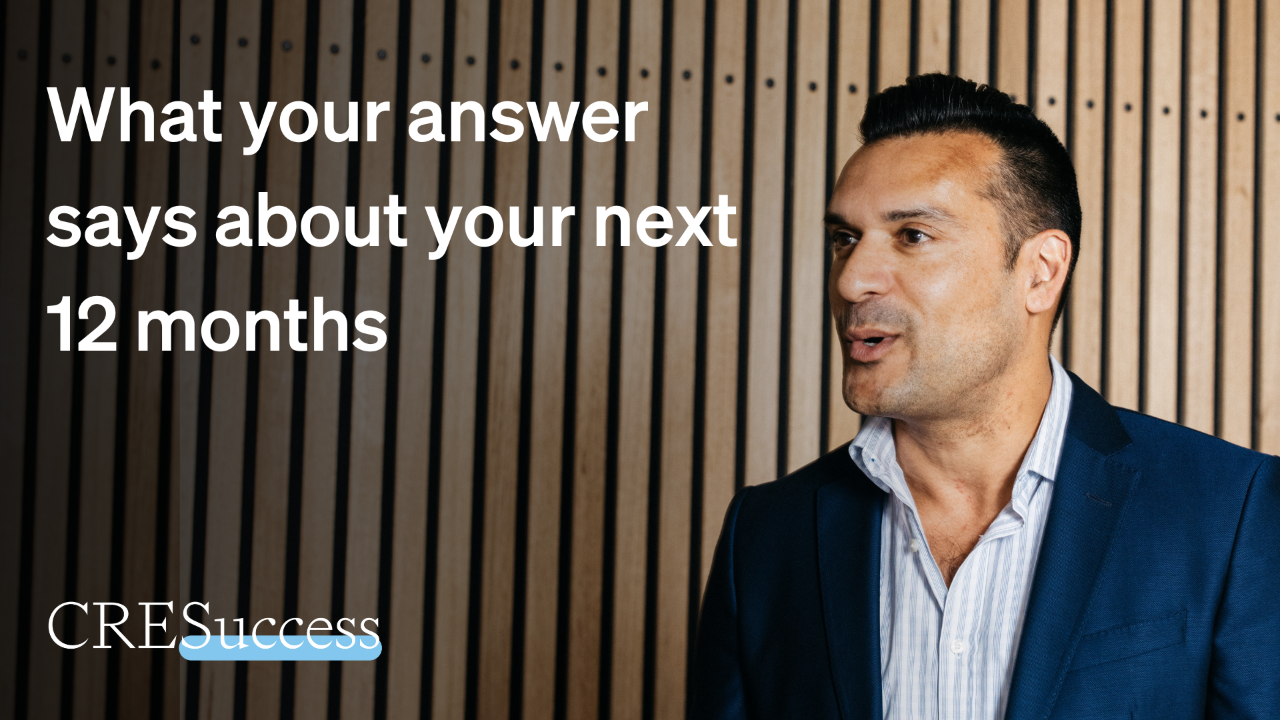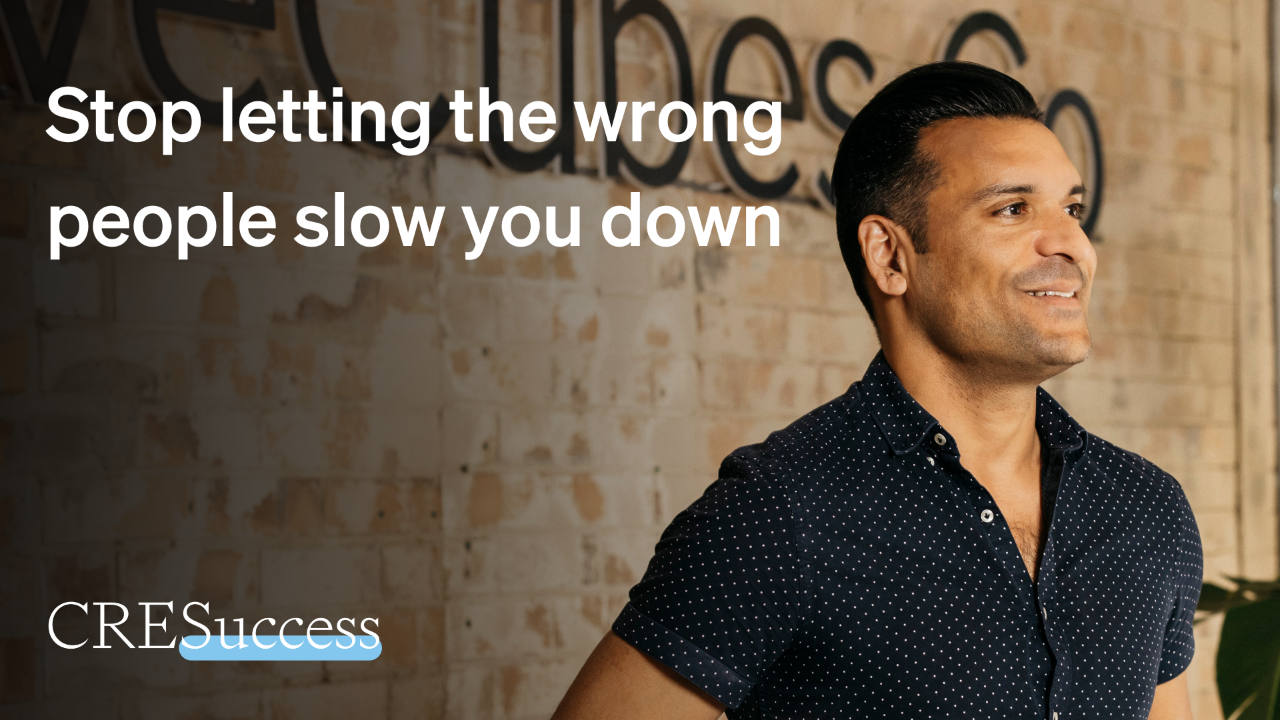Read this if goal setting feels like a chore or a waste of time.
Dec 11, 2024
CRE Success Principle: Ambitious goals unlock creative pathways in your mind. When you aim higher, you think bigger and achieve more.
Last month, while setting some new financial targets for next year, a client asked me something that made me stop and think:
“Why bother setting goals when factors outside our control can change things? Why don’t we just resolve to work as hard as we possibly can?”
It’s a fair question, and I’ve since spent some time thinking about it, to make sure I’ve got a better answer next time it comes up!
So, here’s the truth—goal setting isn’t about predicting the future. It’s about committing to your future performance.
Goals give you clarity, direction, and focus. Without them, how can you be sure if you’re really making progress?
The beauty of setting more ambitious goals is that they encourage you to think creatively, push boundaries and try new things.
Even if you need to adjust along the way, the act of setting a bigger goal creates accountability and helps you unlock more of your potential.
As the end of the year approaches, you might be thinking about what you want to achieve in 2025. Setting goals can be the first step towards making your desires become reality.
I unpack all this (and more) in episode 201 of Commercial Real Estate Leadership – make it your goal to check it out now!
Episode transcript:
I’ve got a bit of curly question from a client last month.
I'm working with this particular client.
There are four directors that I'm working with and we were going through the exercise of forecasting turnover for the current financial year and the current financial year.
And as we were making those forecasts, one of the directors said, “Well, why are we doing this?
What's the point of setting goals? Why don't we just work as hard as we can and then we'll get the best results possible.”
Now, that is not an unreasonable view, and it's something that I've heard from a client in the past before.
So, I thought that it was something which I should have better response to.
I did manage to sort of fumble my way through an answer to a standard which was good enough for us to continue with that exercise.
But I did reflect on that question and I thought that it's something that probably some other people are thinking about.
And I really believe in goal setting.
Goal setting has helped me achieve a lot of things that I probably wouldn't have achieved if I hadn't have set the goal in the first place.
But let's actually make that real by talking today about what is the benefit of setting goals.
Hello and welcome to episode 201 of Commercial Real Estate Leadership. I'm your host, Darren Krakowiak. Really appreciate you joining us for another episode.
So close to the end of 2024.
Most offices around Australia will be closing between the Christmas and New Year, period probably for a period of two weeks.
And for some people who are workaholics who are high achievers, that can be source of anxiety.
The idea of having to switch off to reset, to recharge, to reflect and then to come back rejuvenated in 2025.
If that's you, if you don't like the idea of switching off, I just want to remind you that you need some time away from the hustle and bustle.
You need to occasionally step away, step back, take some time off so that you can perform at your peak when you need to.
So that you can be the leader that you need to be. So, your people can be the best that they can be. So, you can serve your clients. So, you can achieve the optimal results for your business.
Taking some time away, switching off is completely consistent with that because everyone needs a break from time to time.
And if you are going to be the night watchman who's going to be working through the Christmas New Year period for any emergency property management issues that may come up, well, then you should be looking to take some time off in later January.
Because things don't really get going in Australia until after Australia day.
And a few of your staff will certainly be back by the middle of January.
So, if you don't currently have some time off for January, set the goal right now.
And also think about when do I want to take time off throughout 2025?
How much time do I want to take away?
Because the time that you take away will make you better when you are at work.
And that leads me into our discussion today about goal setting, setting goals and how much time you're going to take off.
Because I believe that goal setting is something that's really important.
It's something that I encourage my clients to do and it's something that has helped me produce better results.
But sometimes it's not clear to other people why it is that they should set goals.
And as we come up to the end of the year, a time when many people do make commitments about their future because they set new year resolutions, I think that it's timely for us to have this discussion.
And the idea about making a commitment to your future is exactly what goal setting is.
It's not prediction about what's going to happen. It's a commitment to your future performance.
It provides you with clarity, it gives you direction and it creates focus.
You know that song by Katy Perry? “Have you ever felt like a plastic bag floating through the wind?”
You don't want to be like that plastic bag, also as seen in the opening seat, I think of American Beauty.
You want to know where you're going, you want to be able to measure your progress, you want to be able to assess your performance.
If you're just working as hard as you possibly can, then how do you know how you're going versus what was actually a possible based on the resources that you have, based on how you performed last year, based on what is going on in the marketplace.
When you've got goals, it encourages you to try new things.
If you set a goal for improved performance, you're not necessarily going to get there by just doing what you've always done in the past.
So, setting goals can trigger new behaviors.
At the same time, it can keep you focused because it can stop you from getting shiny object syndrome, from being distracted, from procrastinating and keeping you focused on the things that are going to move you closer towards the goals that you've set.
When you've got something tangible to work towards, you've got something that can motivate you to push boundaries.
And that can move you closer towards your long-term vision.
I don't know about you, but for me, it's easier for me to maintain momentum when I can see the progress that I've made.
And when there are tangible targets that creates the accountability to also keep on going.
Now, one of the arguments that some people make against goal setting is, “Well, if I set a goal to write $700,000 worth of fees and get there in the eighth month of the year, then what do I do then?”
Well, I think you reset the goal.
You've done better than you expected so well done to you.
It might be because the goal wasn't really ambitious enough by the way.
But if you've set an ambitious goal and you've still gotten their way sooner than you thought, well, then you set yourself a stretch goal.
And the reverse is true. If you're working towards 700,000 and at the eighth month of the year, you're sitting on 300,000 and your pipeline suggests that you're not very likely to hit that $700,000 annual goal, well, what would be revised a goal, which would still represent a good result based on where you are now and the remaining time that you have in that period.
I think that you can still then get the benefit of the personal satisfaction and accomplishment that comes from achieving a goal, even if you have to adjust it.
You can still celebrate if you hit that new goal. Or if you've hit your goal, you can celebrate hitting that goal and you can celebrate also hitting your revised more ambitious goal.
And when you achieve a goal, whether it's a revised goal or the goal that you originally set, you get a boost in confidence.
And I think you get some enthusiasm for actually setting new and bigger targets the next time around.
So, I think the problem with just saying that I'm going to work as hard as possibly can is that it means that you don't really have lot of purpose.
When you've got goals, it helps you allocate your time and resources more effectively.
You can ask yourself, is what I'm doing now actually moving me closer towards my goals?
And another argument for setting goals is that the studies show that they work.
You are 42% more likely to achieve a goal. Psychological studies have proven this just by writing down your goals on piece of paper.
What happens when you write them down is you intellectually engage and you emotionally connect with the goal that helps with commitment and also with motivation.
When you write down goals, you kind of transform abstract ideas into tangible targets.
That's what makes them more concrete and actionable.
So, the first step to achieving a goal is to creating a future in your mind where it actually exists.
And then your mind's connection to that future becomes stronger when you write it down.
So, individuals who write down their goals and then also develop plans of action. So, they create a plan and then they take action and they also share their goal with someone else.
If you do all of those things, you are massively more likely to achieve your goal than if you just set a goal and keep it locked in your mind.
Now, this is not like a magic trick, this is not the secret.
You do need to create a plan and take action to get the results that you're looking for.
But that additional layer of accountability I think is great if you've got a team.
One thing that I used to like to do with my team was to set a personal goal and a professional goal.
A professional goal, because that's relevant because we're in business context.
But also, a personal goal. If everyone sets a personal goal and shares it with the people that they work with, what we start to learn is, well, what's important to this person?
What is it something about them that is important enough for them to set this as personal goal?
And that I think also brings people closer together.
If you go through an exercise with your team as setting goals or if you want to make sure that you're setting the best possible goals, I do recommend that your goals are ‘SMART’.
That is an acronym for Specific, Measurable, Ambitious, Relevant and Time bound.
Most people use the word ‘Achievable’ instead of ‘Ambitious’ for the ‘A’ but I reckon that your goal should be ‘Ambitious’ so you have a real sense of accomplishment once you have achieved them.
So, an example of a goal that's not really that ‘SMART’ is one that says like, “I'm going to do more deals in 2025.”
Now, there are some things that you can measure with that. It might be relevant. It's got little bit of time around it.
But if you want to get a goal, which is more specific, that's more measurable, that's more ambitious, that's more relevant and more time bound, you might say, “I aim to close 10 deals that each generate a fee of at least $50,000 by the 31st of December 2025.”
And if that is a significant improvement upon what you did last year, that would be an ambitious goal.
It's certainly one that you can measure. It's got a lot more specificity around it as well than just saying, “I want to do more than I did last year.”
And one more point I want to make about ambition because I reckon setting ambitious goals is something that has really helped me.
If I just give you this analogy, if I had the 100 listeners to this podcast episode over the next week, if I split them into two categories, and I said to one group, “Hey, can you come back to me with all your ideas to grow a business by 10% in one year?”
And I said to the other group, “Can you come back to me with all your ideas to grow your business by, like to double your business over the next 12 months?”
The ideas that I'm going to get from each group is going to be remarkably different.
Because what happens when you set more ambitious goals is it unlocks new pathways in your mind where you start to think in new and creative ways.
So, setting goals is not just about setting goals for your business.
I recommend that as you're reflecting on how things have gone this year and what you want to achieve in 2025, take a look not only at your business and your personal finances, but your relationships.
So, how much time you want to spend with the people who matter.
Your health, so, whether that's about diet, exercise, your weight, cholesterol, just committing to have regular checkups.
And also, there's your personal goals in relation to, if you're religious, if you meditate. It could be in relation to that sort of spiritual practice, but also it could be around just spending some time to expand your mind.
Final point on goal setting. You don't have to wait until the first of January 2025 in order to set a goal, right?
As I previously shared, I quit drinking on the 29th of December 2019. Nearly five years.
It was supposed to be on the 1st of January 2020 but I was ready to go on the 29th of December. So that's what I did.
So, my challenge for you right now is what's one meaningful goal that you can set today or that you can set this week or that you can set for the remainder of this month or for 2025?
Write it down, create a plan, take action and you'll be much closer towards it happening.
That is my episode for you today. Thank you so much for listening and I will speak to you soon.








